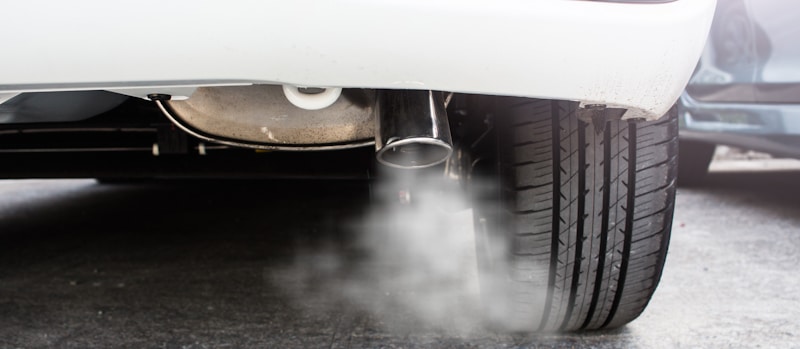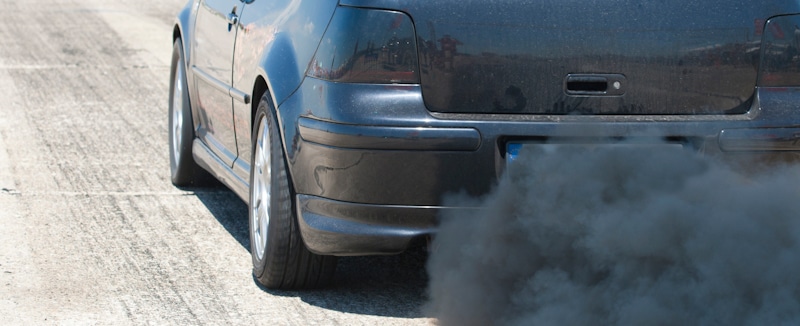When your ATV or car is functioning properly, you will not likely see black smoke from the exhaust. In other words, black smoke from the exhaust indicates that there could be a malfunction with your vehicle's engine system.
The main cause of black smoke from the exhaust is problematic fuel injectors. For instance, if your vehicle's fuel injectors are clogged, the air getting into the fuel combustion may not be enough to promote the complete combustion of fuel. Consequently, solid carbon is produced and emitted as black smoke from the exhaust.
However, problematic fuel injectors are not the only cause of black smoke from the exhaust. Sometimes, a blocked intake manifold or clogged air filter could be behind the problem. Read on for more about black smoke from the exhaust.

Reasons Behind Black Smoke From Exhaust
The emission of black smoke from the exhaust of your ATV, dirt bike, or car indicates problems with your engine. It is a manifestation of incomplete combustion of the fuel-air mixture in the engine. In most cases, it could be the lack of enough oxygen which leads to the formation of the unwanted black smoke from the exhaust. Here are some of the causes of black smoke from the exhaust that might help you understand your vehicle's functioning.
Blocked Air Filters
Blocked air filters are the main cause of the black smoke you see coming from your machine. Continuous exposure to dirt and dust may eventually lead to air filter clogging. Consequently, the amount of air getting into the engine's combustion chamber will be restricted, resulting in incomplete combustion. In other words, there will be more fuel than the required proportionate amount of oxygen.
Damaged Fuel Injectors
Other than the clogged air filters, the other problem that may result in black fumes coming from your vehicle's exhaust is damaged fuel injectors. Whether the fuel injectors are clogged or damaged, the result is an unbalanced fuel-air mixture during the combustion. When the fuel injectors are damaged and hence improper spraying from the injectors, there will be more than the required amount of fuel in the combustion.
On the other hand, when the fuel injectors are clogged, there will not be enough fuel in the combustion chamber. In either case, the combustion will not be complete, thus leading to the formation of black fumes eliminated through the exhaust.
Disposition Of Engine Residue
With time, there are chances that fine particles made up of metal deposit on the surface of the engine. If there is no adequate engine lubrication, the particles also find their way to the combustion chamber. Consequently, they promote the formation of black smoke during the combustion of the fuel-air mixture.
Damaged EGR Valve
The EGR valve reduces the emission of nitrogen oxides from the vehicle's exhaust. Therefore, if the EGR valve is damaged, nitrous oxides in the exhaust gaseous will increase significantly, thus leading to black emissions.
Damaged MAF Sensors
The MAF sensors determine the amount of air getting into the engine, which influences the amount of fuel injected inside the cylinder. Technically, the MAF sensors ensure a balance of air-fuel mixture for complete combustion. If the Mass Airflow sensors are damaged, the air-fuel mixture may be unbalanced, leading to poor engine performance. The problem is manifested through black smoke from the exhaust.
Damaged Piston Rings
Lastly, damaged piston rings may be the cause behind the black fumes from your vehicle exhaust. The piston rings' role is to prevent engine oil infiltration inside the combustion chamber. If the piston rings are damaged, the engine oil will likely flow into the combustion chamber, resulting in an unbalanced mixture of air and fuel in the combustion chamber. Hence, black fumes come from the exhaust of the vehicle.
Black Smoke From Exhaust When Accelerating
If your vehicle blows black smoke from the exhaust when accelerating, then that is a problem that you need to fix the earliest opportunity you get.
Black smoke from the exhaust when accelerating is an indication that the engine is fed fuel that is not proportionate to the amount of air in the engine. An unbalanced mixture of fuel and air in the combustion chamber will result in incomplete combustion. Hence black fumes through the exhaust of the vehicle.
Black Smoke From Exhaust On Startup
Generally, black smoking from your vehicle's exhaust indicates a faulty air-fuel ratio mixture in the combustion chamber of your engine. If you experience the problem after starting the vehicle, only for it to disappear letter that may signify a problem with your piston rings. Piston rings are designed to prevent engine oil from infiltrating the combustion chamber.
If there is less air or excess fuel in the combustion chamber, the resulting incomplete combustion will manifest in black fumes from your vehicle's exhaust.
White Smoke From Exhaust
White or black smoke from your vehicle exhaust is never a good sign. Technically, a well-functioning vehicle should not have any smoking coming out of its exhaust.
Several reasons might occasion the white smoke coming from the exhaust. They include;
Condensation Buildup
If you notice thin white smoke that starts up and then disappears, that could result from condensation buildup. The phenomenon is expected during the winter or cold mornings. Typically, the white smote caused by condensation buildup is thin, hardly visible, and comes out in small amounts upon start-up. However, this type of smoke does not indicate problems with your engine. That changes when it occurs in conjunction with problems such as difficult starting.
Damaged Coolant Reservoir Tank
If the coolant reservoir tank of your vehicle is cracked or damaged, it may leak the coolant into the combustion chamber. The coolant then burns, creating a thick smoke from the exhaust. To solve this problem, you may need to fix or replace the coolant reservoir tank to solve the problem.

Cracked Cylinder Head
If you have a cracked cylinder head or are damaged, the coolant will likely mix with the oil. When this happens, the oil becomes contaminated through thick white smoke from the vehicle's exhaust. Notably, a distinct stubborn odor is produced as the coolant mixes with the fuel.
Cracked Engine Block
Another potential cause for white smoke coming out of your vehicle's exhaust is a cracked engine block. A cracked engine block will allow the contamination of the fuel, which will result in the white smoke coming out of your vehicle. Besides the white smoke, you may experience problems such as puddles of fluid under your vehicle, discolored coolant, frozen coolant in the radiator, and dismal performance.
Repairing the engine block is expensive and may require the input of a professional. In other words, you should be ready to spend significant money and time if the cracked engine block is behind the emission of white smoke from your vehicle's exhaust.
Engine Control Unit Error
Another common cause of white smoke fumes is engine control unit error. Even if there is nothing wrong with the fuel injector, a faulty engine control unit can make the fuel injector malfunction. Fortunately, the only thing you need to do to rectify such a problem is to rest or repair the engine control unit. That will correct the fuel injector's timing and solve the problem.
Conclusion
The exhaust smoke is abnormal and can indicate a problem with your engine system. A well-functioning vehicle should not emit any color of fumes from the exhaust. If your vehicle is emitting black smoke, then there is an air-fuel ratio problem that you need to fix for optimum vehicle performance.
Shawn Manaher loves to play with new toys and dive into new hobbies. As a serial entrepreneur, work definitely comes first but there is always room for hobbies.

![Main Causes Of Black Exhaust Smoke: [BEGINNER'S GUIDE]](https://hobbynation.net/wp-content/uploads/2022/08/black-smoke-from-exhaust-720x405.jpg)